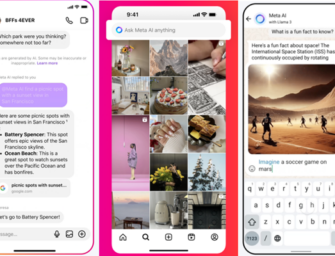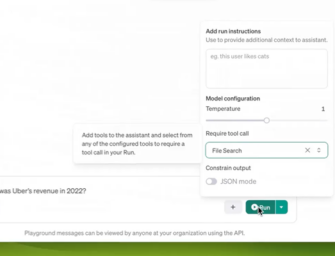Amazon, Baidu, Cerence, Microsoft, Tencent, and 30 Other Companies Launch Voice Interoperability Initiative
Amazon announced today the creation of the Voice Interoperability Initiative, which a media release summarizes as “a new program to ensure voice-enabled products provide customers with choice and flexibility through multiple, interoperable voice services.” In short, this group is focused on enabling the simultaneous presence of multiple assistants on voice-activated devices. That means multiple wake words can be used anytime to access a preferred assistant. The announcement summarizes the “four priorities” of the Voice Interoperability Initiative:
- Developing voice services that can work seamlessly with others, while protecting the privacy and security of customers
- Building voice-enabled devices that promote choice and flexibility through multiple, simultaneous wake words
- Releasing technologies and solutions that make it easier to integrate multiple voice services on a single product
- Accelerating machine learning and conversational AI research to improve the breadth, quality and interoperability of voice services
The 3 Devices with Simultaneous Wake Words Have One Thing in Common

The first mass-market smart speaker with multiple, simultaneous voice assistants was Facebook’s Portal smart display. That included Facebook’s Portal assistant which has limited functionality related to Facebook content and services and video chat. In addition to “Hey Portal,” users can also say “Alexa,” to access services from Amazon’s assistant anytime.
This was followed by two other smart speakers from Orange and Deutsche Telekom in 2019. Orange’s device also offers Alexa access alongside its own Djingo assistant. Similarly, Deutsche Telekom users can invoke wake words from either “Alexa,” or the company’s own assistant by saying, “Hey Magenta.” As I discussed in this week’s Voice Insider Issue #56, there are three true multi-assistant devices and they all have one thing in common: Alexa.
The Google Assistant Wall
One company that does not offer simultaneous access to multiple voice assistants is Sonos. This is true despite statements going back to 2017 that it would. There is a telling quote from Patrick Spence, Sonos’ CEO, in Amazon’s announcement today which says:
“We value freedom of choice, empowering listeners to choose what they want to listen to and how they want to control it. We were the first company to have two voice assistants working concurrently on the same system, a major milestone for the industry. We are committed to a day where we’ll have multiple voice assistants operating simultaneously on the same device, and are working to make that happen as soon as possible.”
Pay attention to the words “concurrently” and “simultaneously.” The Sonos One smart speaker offers access to both Alexa and Google Assistant, but only one or the other can be accessed at a time. To switch between them requires the device owner to change the configuration settings. That process is manual and as a result, once Sonos One and other smart devices from the company are configured they are effectively either an Alexa or Google Assistant-enabled device and not both. That leads “concurrent” but not “simultaneous” voice assistant access in Sonos marketing nomenclature.
Contacts familiar with the discussions at Sonos tell me that the company wanted the simultaneous access of both Alexa and Google Assistant but Google refused. This is detailed in Voice Insider Issue #25. Similarly, contacts familiar with the efforts behind Orange’s and Deutsche Telekom’s smart speakers tell me each wanted to consider running their own assistant alongside Google Assistant and found it is was not an option. The companies still may have chosen Alexa as their second assistant, but in the end, it was the only option.
Even Telefonica, which demonstrated the integration of its Aura assistant with Google Assistant at Mobile World Congress in 2018, launched its smart display, Movistar Home, without Google Assistant despite rumors to the contrary. Scott Huffman, VP of Google Assistant engineering, even participated in the demonstration an announced Telefonica as among the first to join the Google Assistant Carrier Program. However, that implementation appears to be limited to accessing another assistant after first invoking Google Assistant.
With that said, a Google spokesperson reached out to Voicebot to say that Google is interested in this initiative and plans to consider participation.
“We just heard about this initiative and would need to review the details, but in general we’re always interested in participating in efforts that have the broad support of the ecosystem and uphold strong privacy and security practices.”
Apple, Google, Facebook, Deutsche Telekom, and Samsung Not Represented
Given these circumstances, it may not surprise you that Google is not a member of the Voice Interoperability Initiative. Nor is Apple. The HomePod allows Siri only. You can run Google Assistant, Alexa, Cortana, Hound, and other assistants through iOS apps on Apple devices and they can even have always-listening wake words. However, that can only work if the app is open and in the foreground. You cannot just say “Hey Google” and get a response unless the iOS app is active. Interestingly, while the Google Assistant app is in the foreground you also cannot activate Siri by voice. The microphone channel only allows a single voice-activated wake word at a time. To get back to Siri you can activate the “side” or “home” buttons through long pushes are by moving the Google Assistant app into the background.
The Voice Interoperability Initiative is clearly focused on appliances such as smart speakers, but eventually, there is sure to be a push for this option on smartphones. Samsung, also not a member of the new Amazon-led initiative, faces this conflict today with smartphone users able to set either Bixby or Google Assistant as the always-listening default.
It is notable that Facebook and Deutsche Telekom are not among the 34 founding members of the Voice Interoperability Initiative, given that both support this today. Voicebot has asked for more clarification on membership requirements and will update this article as we learn more details. However, an Amazon spokesperson confirmed that Apple, Google, Deutsche Telekom, Facebook, and Samsung were contacted and invited to join the group.
Automotive is Furthest Along in Multi-Assistant Experiences
A device segment that has had more success to date with multiple assistants is automotive. BMW is a member of the initiative and does offer access to multiple assistants today and Mercedes-Benz does as well although is not a member. The biggest voice assistant player in cars is Cerence, a business that will officially be spun off from Nuance next week and was formerly known as Nuance Automotive. Sanjay Dhawan, CEO of the new Cerence Inc. commented on his company’s participation saying:
“Today’s cars can be noisy and filled with distractions, so to tap into multiple voice assistants and services seamlessly is paramount for creating the enjoyable, safe and productive in-car experience we’re known for.”
There was a time when Nuance would have been more likely to block the introduction of a second or third voice assistant into cars. However, the rise in consumer popularity of Siri, Google Assistant, Alexa, and other solutions led Nuance automotive to become more tolerant of in-car competition for services based on speech recognition due to requirements of the leading automakers. Cerence, as a separate company, appears ready to formalize this position as supportive of a multi-assistant in-car experience.
Broad Industry Adoption
While some of the biggest voice assistant providers may not have yet joined the initiative, more than a dozen hardware developers, engineering and design companies, and system integrators did join. These companies range from Intel and Qualcomm to InnoMedia and CommScope. It is technically feasible to build solutions today that have multiple wake words and offer simultaneous access to more than one voice assistant. However, there is added cost to the integration and the solutions require more processing, memory, and power consumption. The members in the hardware, engineering, and integration industries will work together to “develop products and services that make it easier and more affordable for OEMs to support multiple wake words on their devices.”
It is also notable that Baidu and Tencent are supporting the initiative. Both have smart speakers in the market and are increasingly important voice assistant providers in China. This is contrasted by the absence of two companies with the largest smart speaker installed base in China, Alibaba and Xiaomi.
Will This Drive a Multi-Assistant Future
Some people are still forecasting a single, clear winner in the voice assistant space. That outcome seems increasingly unlikely and this initiative will make it even easier for consumers to access multiple assistants on devices. It is also a strategic play for Amazon. Jeff Bezos calculated long ago either that it is unlikely a single assistant will win or that if that came to pass, Alexa was unlikely to be that winner. By banding together with a broad set of industry players, there will be fewer barriers to supporting multi-assistant devices and that may eventually lead to consumer expectations along these lines which would, in turn, make it harder for Google or Apple to enforce single assistant policies.
Editors Note: This story was updated at 5:00 pm EDT to include a statement from Google about the initiative and add commentary about a multi-assistant future.
Follow @bretkinsella Follow @voicebotai









